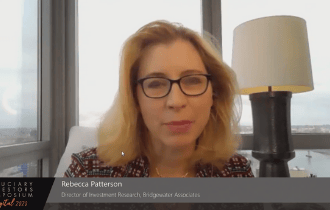Rebecca Patterson, Bridgewater’s director of investment research, says MP3 is the new backdrop that will influence all outcomes in 2021 with the medium term characterised by low interest rates and the possibility of higher inflation.
The backdrop to financial markets in the years ahead will be characterised by fiscal and monetary policy working hand in hand, low interest rates and the likelihood of higher inflation, said Rebecca Patterson, director of investment research, Bridgewater Associates.
Speaking at FIS Digital 2020, she told delegates that so-called MP3 whereby monetary and fiscal policy work in tandem, will continue to impact growth and permeate into economic outcomes across all asset classes.
“MP3 will be here for some time; it is the new backdrop that will influence all outcomes in 2021 and beyond,” she said.
Gone are the days of straight forward interest rate adjustments or the QE/asset purchases governments introduced when interest rates hit zero. The arrival of the pandemic has seen Central Banks move to a policy regime where fiscal stimulus is an even bigger lever. Elsewhere, she pointed to the growing consensus that short term US interest rates will remain on hold through to 2023 – or longer.
“US interest rates influence so many assets around the world,” she said. Elsewhere, the Federal Reserve is also changing how it addresses inflation, seeking to encourage it and change entrenched low inflation expectations.
She said that the Biden presidency will take away the policy uncertainty that defined the Trump presidency. His administration will have a more orthodox set of players allowing companies to base their hiring decisions or M&A activity on a known playing field.
However, she said unknows still exist around fiscal policy and questions around the approval of the next pandemic relief package. The other big unknown impacting future fiscal policy is the outcome of the Senate run-offs in Georgia.
“If the Democrats win both, there are greater odds to getting Biden’s policies through and the probability of greater fiscal spending in the years to come with an impact on asset classes.”
She also noted how Central Banks cannot cut interest rates to make servicing debt cheaper. Now debt levels can only be tackled with a combination of monetary and fiscal policy she said, forecasting fiscal stimulus will go into infrastructure spending, broadband, R&D and green endeavour.
Government spending could also help tackle populism. In a nod to the growing force of populism, Bridgewater has created an index of populist pressure. She noted that government spending in these areas could help ease alienation and people feeling failed by government.
She outlined scope for real yields to fall further given the pressure on Central Banks to keep rates low and reflate their economies. It will mean investors need to increasingly look to other stores of wealth like gold. She also flagged that very little inflation is priced in by the markets.
“Breakevens have risk but US inflation is still around 2 per cent.”
Although she didn’t think there is scope for “a huge rise” in inflation, she said the scope for a spike in inflation is higher than in the past given the combination of monetary and fiscal stimulus.
She also highlighted how the vaccine will impact different sectors of the equity market. The sectors hardest hit by the pandemic like travel and leisure have reacted positively to its roll out and seen investors rotate out of defensive stocks that have done well in the crisis. However, she counselled that in a zero rates world, investors need to allocate to equities with bond like characteristics.
“Defensive names do offer these attributes; a zero-rate world is good for equity markets as investors still need allocations to equities with bond like characteristics for diversification.”
For investors seeking to replace nominal bond exposure with bond-like returns from the public equity market, she said to focus on companies with stable cashflows as well as low vol equities.
“There is a world where you can reduce nominal bonds and get the bond-type returns and diversification you need as an investor,” she said, adding that geographic diversification is more important than ever.
As for the impact of Brexit on UK assets, she said the impact was either “bad” or, in the case of No-Deal, “really bad”. However, she said much of the impact has already been factored into valuations.
“The good news is that since this is a slow movie, a lot has been baked into the price.” Anxiety about the UK’s external financing needs, rock bottom real yields and future tariffs will impact the pound, however.



